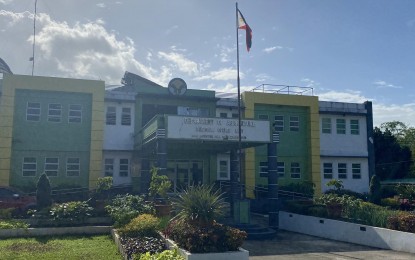
The Department of Agriculture Bicol regional office in Pili, Camarines Sur (Photo by Connie Calipay)
LEGAZPI CITY – The Department of Agriculture in Bicol (DA-5) is now preparing drought-resistant seed varieties for distribution to farmers in the region to cushion the possible effects of El Niño.
In an interview on Wednesday, Mary Grace Rodriguez, DA-5 field operation division chief, said the seeds and crop varieties being made available for distribution are part of the department's adaptation and mitigation initiatives.
"Unahin natin is the mitigation measures and yung mga pwede gawin ng mga farmers natin (Let’s start with the mitigation measures and what farmers can do) which include the crops that we can plant that don't require much water,” Rodriguez said during a media briefing at the DA regional office in Pili, Camarines Sur.
She said DA-Bicol, together with other concerned agencies such as the National Irrigation Administration (NIA), Philippine Atmospheric, Geophysical and Astronomical Services Administration (PAGASA), and the Bureau of Fisheries and Aquatic Resources (BFAR) continue to inform, educate, and collate data as to the possible effects of the forecast water shortage phenomenon in the region.
“We have varieties for rice and vegetables that can withstand limited water. We disseminate the information to the ground so that our farmers can choose drought-resistant seeds like okra, sitaw (string beans) for vegetables. For those animal raisers, the shelters must be protected and covered,” Rodriguez added.
A DA-5 report shows El Niño will likely persist until April to June this year. The provinces of Albay, Camarines Sur, Masbate, and Sorsogon will experience way below-normal rainfall conditions in February, which is detrimental to the crops at their newly planted, vegetative, and reproductive stage, especially in the rainfed, upland, and tail-end irrigation production areas.
As to the potential impact of the weather phenomenon, the agency said a total of 64,603 farmers; 68,749 hectares of rice land; 22,525 hectares of corn farms; and 17,080 hectares of high-value crop farms, will be affected.
Rodriguez urged farmers to report any agriculture damage during extreme weather events to the municipal, city, or provincial agricultural offices.
“For any damages after El Niño, we have ready buffer stocks to provide our farmers for rehabilitation. For the livestock raisers, any mortality recorded must be reported for a rehab plan which can be funded further through the Quick Response Fund," she said.
Rodriquez said the Bicol region has a buffer stock of rice seeds as a contingency plan for any natural disasters that may occur.
“This buffer stock is not just for El Niño but for all other weather disturbances that may happen since the Bicol region is always visited by typhoons, even for the shear line we make a report for that,” she said.
The available seed stocks for rice include inbred certified seeds: 32,000 bags (for 16,000 ha); hybrid rice seeds: 1,650 bags (for 1,650 ha); inbred certified seeds: 27,000 bags (for 13,500 ha) and registered seeds: 1,000 bags (for 500 ha).
Aside from the seeds, DA-Bicol's other El Niño interventions are the distribution of irrigation pumps and sets, the installation of an automated weather station and greenhouses and swine production. (PNA)
